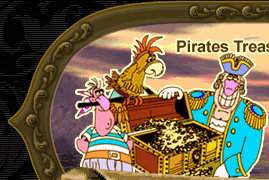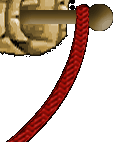Articles by Mark Pilarski
The fundamentals of sound money management
by Mark Pilarski
Anyone can walk into a casino and make the
right bets and know how to play them, but
without sound money management techniques,
you can still end up going home broke.
Money management is your life-line to
getting home with some semblance of your
starting bankroll. Otherwise, you'll be
hanging out in the lounge, tapped out,
trying to score free drinks. Therefore,
below are money management rules I live by
when I'm out trying to procure a little
from the big guys. They will work if you
rigorously apply them.
. First, never bring your entire bankroll
with you to one gambling session. You need
to have a daily gambling budget. Start by
dividing your bankroll by the number of
days you'll be gambling. Then divide your
daily bankroll into the number of sessions
you will be playing each day. This is now
your single-session bankroll. Don't bet
tomorrow's money until tomorrow comes.
. Set a goal of winning between 50 to 100%
of a single-session bankroll. Then set
aside your original bankroll plus half
your winnings. Now play with the remainder
and continue to set aside additional
winnings.
. Use a winning progressive method of
betting by setting a predetermined
percentage increase for each winning bet
and sticking to it. For example, I
increase my winning bets by 50% after the
second win: $5, $5, $7, $10, $15, $22,
etc. I continuously flat bet (table
minimum) when losing.
. The casino's goal is to create a
fantasyland experience for its patrons.
One wily way is to devalue your money by
having you bet chips instead of legal
tender. Think of the deceptive nicknames
chips have. A $5 chip is a "nickel" and a
$25 chip a "quarter." Your best
self-defense is to continue to bet with
your own greenback. This way you'll always
realize its genuine value.
. If you do turn your bankroll into chips,
take a moment and carefully think about
the exchange. You must always treat chips
as hard-earned cash-like the money you
save for your child's college tuition,
mortgage payments or your retirement.
. Never increase your bet when losing. A
double-up-to-catch-up strategy simulates a
lamb being led to slaughter.
. Discipline is not only a significant
part of being a successful gambler but
probably the most important element of
money management. You must set loss limits
and win goals. Example: When losing half
your session bankroll (loss limits) you
walk, and when doubling your money (win
goals), consider doing the same.
. Identify the profitable opportunities in
gambling by shopping for the best odds,
rules and playing conditions for the
casino games you will be playing. Don't
waste your time on games in which the
casino has more than a 2% house advantage.
. Never gamble with money you can't afford
to lose. Need I say more?
. Credit card gambling is nothing more
than a desperate measure to stay in
action. Leave your credit and bank teller
cards at home so you won't be tempted with
the easy convenience of getting cash.
. Never quit a hand when you're on a
winning streak. Why tempt fate? You could
be walking around lucky and not even know
it. Magical gambling moments do happen.
Fifteen, 18, even 20 hands in a row is
possible. When it ends on a loss, make a
mad dash to the cashier's cage.
. Finally, money management will not
affect the house advantage nor guarantee
that you will win more money. If the house
has an advantage before money management,
it still has that same advantage even
after you apply money management
techniques. What good money management
principals will do is minimize your losses
and in most cases protect your winnings. (Top)
Slots Simplified
by Mark Pilarski
Slots are the easiest game to play in the
casino. Insert a coin, pull the handle,
and then reach into your purse for more
money. Unfortunately, that's what normally
happens when the house has such an
enormous built-in edge. But that does not
mean you cannot at least close the gap
against you and throw in some fun to boot.
So, below are some of my favorite slot
tips to help you overcome this huge house
advantage. These tips will not guarantee
that you'll become an instant winner,
because it's tough to beat a house edge
that generally runs well over 10 percent,
but it also doesn't have to be so tough on
your bankroll. Let's get started.
1. The only true skill to playing slots is
machine identification. Example:
progressive machines offer the opportunity
to compare and shop around for the best
value. One 25 cent slot machine carousel
can have a progressive jackpot of $2600
and another bank of machines-exactly the
same and standing side by side-$1900. You
should always be looking for the best slot
opportunities possible.
2. Casinos will advertise machines that
have a 98.5 percent payback. WOW! A casino
game holding just a percent and a half,
and on a slot machine no less. But there
is a downside. If you look closely at the
advertisement, it will probably say, "on
select machines." Furthermore, it probably
will not be posted on the machine itself,
and generally will be limited to a single
bank of machines in the casino. Now it
becomes your responsibility to find them.
Easiest way: Ask a slot employee, and if
he or she doesn't know, have one of them
ask a direct supervisor.
3. Las Vegas gives away over one-half
billion dollars in comps each year, and as
a slot player, you deserve your share.
Repeat, you deserve your share. How?
Casinos now offer you the ability to "comp
yourself" by using one of their player's
club slot cards. It is generally based on
the number of coins you cycle through a
machine, so you might as well get credit
for all those quarters you're inserting.
Shop casinos for comp value and find out
what you are worth to them.
4. You always want to treat "comps" as a
form of profit, but you never want to
gamble just to receive them. It's much
better to play a 98 percent payback
machine and increase your winning
opportunities than play machines with a
poor return that cycle more of your coins.
Remember that you're there to stay in
action and possibly win, not lose your
bankroll for a free buffet.
5. If you cannot afford to play the
maximum amount of coins, you should not be
playing that denomination of machine. If
dollar slots are too rich for your blood,
drop down to a quarter machine. It is
always better value to play five quarters
versus one dollar, or five nickels instead
of one quarter.
6. I recommend not playing back the
credits you have accumulated. Cash out and
take stock. The problem with playing back
credits is that the longer you stay, the
machines built-in advantage eats away at
them. It doesn't take long to zero out.
7. Avoid restaurant, bar, supermarket and
airport slot machines. Notorious for being
tight.
8. Can't decide which type of slot machine
to play? If you are going to choose
between video poker and slots, play video
poker. Even poor play on a video poker
machine will have a better payback than
most "reel" slot machines.
9. Before you walk away from a machine,
don't forget to press the cash-out button.
Millions are lost each year by gamblers
forgetting their winnings (stored
credits).
10. It is your responsibility if destiny
favors you that you receive full payment
when hitting a jackpot. Even with some
relatively small jackpots, if the slot is
short coins in the hopper, you will
receive only a partial cash payment in the
tray, with the balance to be paid by a
slot attendant. If you were to insert more
coins and pull the handle, say good-bye to
the remainder of your jackpot.
11. Read all the posted material on a slot
machine. It is your responsibility to
fully understand all printed information
concerning the number of coins to insert,
lines needed to be lit, prizes or awards.
In most cases, when someone calls a slot
attendant over and complains the machine
"just ripped me off," that individual
generally did not read the pay schedule
correctly.
12. When you insert coins, don't assume
all the tokens register before you pull
the handle. Played five but only four
recorded? SORRY. You will get a
sympathetic pat on the back from the
casino, but no money.
13. I recommend avoiding machines that use
video representations of symbols. With
these slots, there is absolutely no way to
figure out what the payoff percentage of
that machine is. For all you know, your
true chances of hitting a major jackpot
could be 2,097,152 to one.
14. Most casinos will hold a slot for you
while you go to the restroom, take a short
break, or even go on a buffet run. Just
ask a slot supervisor to reserve your
machine and give a specific time when you
will return.
15. Don't chain yourself to a cold
machine, even if it is your favorite. Why?
Because the longer you stay on any slot,
the more time the machine's built-in
mathematical advantage has to work you
over. This is how casinos build
mega-resorts. Time always works on their
side, and they have a mathematical edge on
every slot.
16. Just because you're only playing
slots, you still need to set a loss limit
on your bankroll for both your trip and
each individual gaming session. Divvy up
your wad per playing session, discipline
yourself and stick to it.
17. I'll come clean here. I don't play
slots. But as a local in a casino town, I
know where the locals who do play find the
most cluck-for-the-buck. Simply put,
locals don't play dog machines. So when
searching for high payback machines, ask a
few employees where the locals find the
best slot value. Even if they are not slot
players themselves, they at least know
where their friends like to play.
18. Leave both your credit and bank teller
cards at home so you will not be tempted
with the easy convenience of getting cash.
Also, allow me to take the obvious one
step further. Only bet what you can afford
to lose.
Finally, going to slot heaven-Las Vegas?
Your best return in Las Vegas, and the
country for that matter, are in the
casinos Downtown or N. Las Vegas. Average
return on quarter machines: 95.5 percent.
That almost makes it a decent wager.
(Top)
Victory at Video Poker
by Mark Pilarski
In video poker, only 21% of the hands
dealt are winning hands of Jacks or better
and 79% are downright dogs. Herein lies
the difference between the winning and
losing player: what you do with those 79%
of the hands that need to be groomed into
winning greyhounds. The best way to give
yourself the greatest chance of victory at
video is to read, absorb, embrace and
pledge allegiance to these playing tips.
-
Seek out Jacks or better
machines that pay 9 coins for a full
house and six coins for a flush.
-
If you decide to play a
progressive video poker machine that
pays 8 coins for a full house and 5 for
a flush, play on a progressive where the
jackpot is over $250 on a nickel
machine, $2,500 on a quarter, and
$10,000 for the dollar.
-
Always bet the maximum
amount of coins on a progressive machine
to get the bonus for royal flushes.
-
If you are a novice
player, play on the lowest denomination
machine until your level of expertise
rises.
-
If your casino offers it,
use a casino slot card to get credit for
your play. You might as well get a
return as a comp benefit for your play
on their video poker machines.
-
Be sure to ask how many
points you will receive per dollar
played, and then find out what those
points are worth in comps. This will
help you shop for better value on your
play.
-
Take your time to study
every hand. Because you are playing
against a machine, no one will
intimidate you if your play is too slow.
-
All hail the Jack! Some
players don't realize the ace is not the
most important card in the deck, but the
Jack is. Holding the Jack over the ace
gives you more opportunities of making
more lucrative hands than an ace would.
-
There are more than a
hundred different video poker machines
to choose from. Games like Joker Poker,
Louisiana Jacks, Gator Poker, etc. offer
you a supermarket selection, but all
have different paytables needing
distinct playing strategies. I recommend
learning and limiting your play to two,
such as Deuces Wild and Jacks-or-Better.
-
Acquire video poker
skills using either a computer or a
hand-held video poker game. The major
benefit of this type of training is the
ability to test you skills with no
financial risk or ruin. You can gather
data later review, enabling you to nix
trends that would be costly on a video
poker machine. This information would
take you years to accumulate under
normal casino conditions. And again, the
key here is that any knowledge obtained
without a casino outlay lets you net out
better down the road.
And now, some playing
strategies.
First, Never keep a kicker
with any pair. Holding a kicker to any
pair reduces your return by 5%.
2nd, Never draw four cards
if you can draw three to a royal flush.
3rd, Always keep five-card
winning pat hands with on exception: if
you can, draw one card to a royal.
4th, Don't break a flush
even if you can draw one to a straight
flush, but
5th, always break a flush
to draw to a royal.
6th, Never break a straight
to draw to a straight flush.
7th, Never draw five if you
have a jack or better, and
8th, don't keep a ten for a
four card draw.
(Top)
Craps with confidence
by Mark Pilarski
Bellying up to a crap table and joining
the euphoria of this fast-paced game need
not be intimidating. Armed with my past
columns and these additional pointers, you
are going to step up to the table with the
self-assurance necessary to play this
game. Granted, I am limited in allotted
space, but I'm more than happy to touch on
some terrific craps tips. In thirty
seconds I can teach anyone how to play a
simplified game of craps with confidence.
How? Check out the first tip.
. Just make these two outstanding craps
wagers. Nothing more. Learn how to make a
Pass Line bet or how to Place the 6 or 8.
Both of these wagers have house advantage
of less than 1.5 percent, making them one
of the best bets in the casino.
. Stay away from all those proposition
bets in the center of the layout. The
dealer who is barking their performance is
doing nothing more than inducing play on
wagers that are all "house bets", carrying
a casino advantage as high as 16%.
. Once you learn how the Odds wager works
(another column, another day), never make
a Line or Come bet that you are not
willing to back up with full odds.
. If the table minimum is way over your
head, you shouldn't be on that game. Bet
with your head, not over it.
. If you need help, ask a dealer. Most
will be willing and able to help you.
. You are responsible to pick up your
winnings. As they say, "they lay, they
play."
. A Pass Line bet with two Come bets is
plenty of action on this energetic game.
Don't get so caught up in the game and
start throwing money at the dealer for his
"requested (high house percentage) bets."
. Do not try to hand cash to the dealer to
make change. The dealer is not allowed to
take any cash or chips directly from the
customer. You need to place your money on
the layout, before the shooter gets the
dice, and ask the dealer for "change
only."
. Some wagers like Pass/Don't Pass bets,
Odds, Come wagers, the Big 6/8 or Field
bets can be made by you. On the other
wagers, place you money on the layout and
ask the dealer to make those bets for you.
. Keep your hands off the table and out of
the way of the dice being thrown. You do
not want to disrupt the game by altering
the toss with your hands.
. Tables have rails all the way around for
storing your gaming chips. Use them. Also,
underneath, there is shelving for your
drinks.
. If you are the shooter, give the dice a
good toss across the table. Never try to
slide dice across the layout thinking you
can control the outcome. The first time
the boxman will call out, "No roll." The
second time, possibly some token
punishment like a slapped wrist. The
third-adios Sally.
. If you are a Don't Pass bettor, don't
scream out, "Come on, seven!" Betting
against the majority of players is bad
enough, but rooting against them and
gloating after a win is awful form. (Top)
Blackjack Tips
by Mark Pilarski
Keep your emotions under control. The
dealer is only the messenger of fate.
Don't take you're losses out on him.
Always remember you can win. You didn't
bring $100 to a casino to play with and
lose. If you are losing at a particular
table, set a three-losses-and-you-move
routine.
Focus on the dealer and his up card, not
your neighbor's cards. If other players at
the table are upsetting you with their
playing strategies, you can move.
Drinking and gambling do not mix. Players
have been known to lose thousands waiting
for their free drink.
You must have discipline, so set loss
limits and win goals.
Only bet what you can afford to lose.
Rent, car payments and other day-to-day
expenses have no place in a casino.
Even the small blackjack player deserves
to be rewarded for her play. There is
nothing wrong with asking for a free
breakfast, lunch or something smaller like
a deck of cards or a pair of dice. But
since pit personnel are most likely not
tracking your play, you will need to ask.
Most players don't even consider the rules
before they sit down and play. If you
don't know the rules or any of the playing
strategies of blackjack, learn the game on
a 25-cent video blackjack machine. A
five-dollar blackjack game should not be
your classroom.
When you feel tired, it's time to call it
quits, or at least take a break and rest
for an hour or two.
Compared to a single deck, a two-deck game
handicaps your play -0.35%, four decks,
-0.48%, six decks, -0.54% and eight decks
-0.58%. As you can see, it is always to
your advantage to play on a game that
offers the fewest decks. Also note, the
house edge goes up substantially when you
go from one deck to two, but the change is
less dramatic as you add more decks. How
much is this costing you in dollars and
cents? If you were to play 100 hands per
hour at $5 per hand, each -0.1% would cost
you approximately 50¢ per hour. Playing on
a game with two decks versus one deck will
cost you $1.75 per hour, with each
additional deck costing you increasingly
more.
Smart blackjack players always play in a
casino that offers the best rules. To
avoid hostile playing conditions in
blackjack, look for the following
combination of rules that are favorable to
the player:
a single deck game
surrender, both early and late
double down allowed on any two cards
double down allowed after splitting pairs
multiple pair splitting allowed, plus
resplitting aces
dealer stands on a soft 17
deep deck penetration
(Top) |














